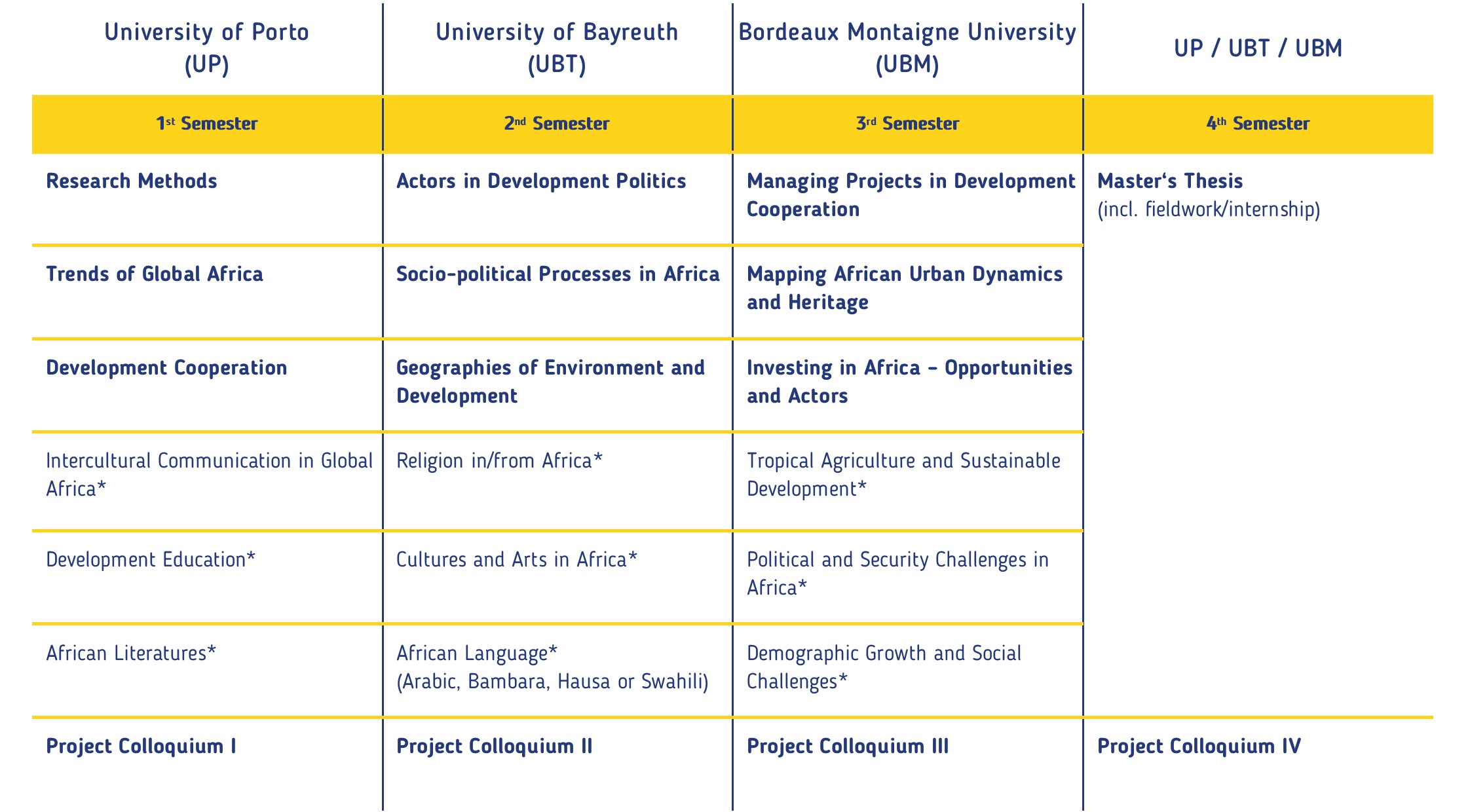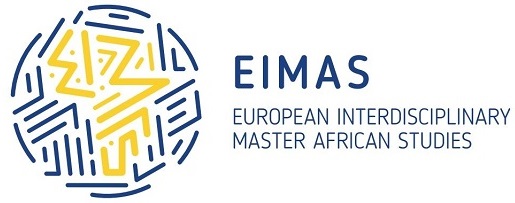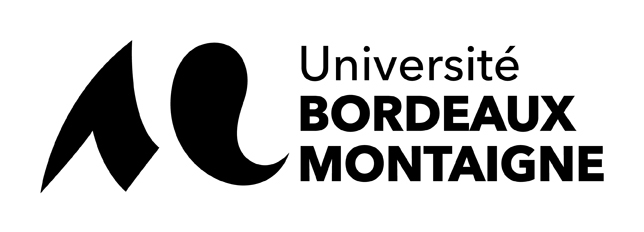Curriculum and Modules
Curriculum

* Two out of three modules have to be chosen.
For each succesfully completed course in the first three semesters, students will receive 5 ECTS.
For the Master's Thesis, students will receive 30 ECTS.
Additional languages courses in Portuguese, German and French are highly recommended (without ECTS).
More information on the curriculum and the individual modules can be found in the Module Handbook.
Modules
University of Porto:
Research Methods
Prof. Dr. Hugo Daniel Ribeiro Silva
This course module provides the students with skills to handle the different stages required by the production of scientific knowledge, i.e. from choosing a research topic and a research question to presenting the results of academic work. It comprises the theoretical, the methodological and the empirical steps towards a successful and rigorous process of knowledge building, including the critical analysis of state of the art literature, the selection of data, the creation of datasets, the methods of analysis and a successful communication of results. Handling scientific communication skills will also be targeted.
Trends of Global Africa
Prof. Dr. Maciel Morais Santos
This course module provides the students with an understanding of the great historical trends of African history within the context of World History. The students develop a profound comprehension of current economic, political and societal developments in Africa via an understanding of the past.
Development Cooperation
Prof. Dr. Maria Helena Vilaça / Miguel Silva
This course module equips the students with a reflexive ability and reasoned critical analysis on the contemporary African societies and social change in a globalised context in which cooperation is paramount. It sheds light on key organisations, concepts, actors as well as successful and unsuccessful strategies of cooperation involving Africa. It connects the comprehension of economic, social, political and cultural obstacles to development with variables interacting with cooperation policies, involving European and other international actors.
Intercultural Communication in Global Africa
Dr. Isabel Galhano Rodrigues
This course module sensitises students to the challenges of social interactions in African contexts. They acquire techniques to become aware of ethnocentrism and eurocentrism, to recognize prejudices and discrimination, to identify and interact with forms of behaviour with the “other” and to develop the ability to recognize values and cultural practices, in order to interpret assumptions and implicit meanings.
Development Education
Prof. Dr. Luís Grosso Correia
This course module aims to support students to increase their awareness and understanding of the interdependent and unequal world in which we live, through a process of interactive learning, debate, action and reflection. It challenges perceptions of the world and encourages students to act for a more just and equal society at a national and an international level. It works to tackle the root causes of injustice and inequality. It will engage students to use participatory methodologies to increase their knowledge of global issues and develop their skills of team work and advocacy. Justice; Global development; Human rights; Global citizenship; Global poverty and inequality; Stereotypes and prejudice are topics to be dealt with.
African Literatures
Prof. Dr. Francisco Topa
The course will provide students with a global view of the diversity of literatures from Africa. To this end, a representative set of texts, written in English or translated into this language, of various genres (including oral literature) and of various linguistic, cultural and national spaces will be studied. The time period covered will also be extensive, including texts from the pre-colonial, colonial and post-colonial periods.
Some of the themes that mark African literatures, such as the colonial clash, the conflict between tradition and modernity, African identities, the post-independence disillusion, and gender issues will be discussed.
University of Bayreuth:
Actors in Development Politics
Prof. Dr. Alexander Stroh-Steckelberg / Prof. Dr. Jana Hönke
This course module teaches students the organisation and behaviour of development stakeholders on the international, national and local levels as well as in the public and private sphere. Development agency will be analysed from theoretical and empirical angles. It conveys knowledge on agency in current discourses about sustainable development and research in Development Studies as well as behaviour and practice in development work. Students deepen their knowledge about the theories of agency and development policy as well as their practical application. They are put in a position to analyse the structure, interests and behaviour of development stakeholders and to put this knowledge about agency into the context of successful and failing development efforts in Global Africa. Students learn how to identify and critically assess disputable actions and to propose alternative options for applied use.
Social-political Processes in Africa
Prof. Dr. Alexander Stroh-Steckelberg / Prof. Dr. Jana Hönke
This course module deals with different aspects of social structures of African societies as well as the political structures and processes by means of surveys and specific examples. Students acquire the ability to deal with specific aspects of Development Sociology as an analytical approach for analysing countries in Global Africa. This includes key questions about identity, which have often been suspected of critically shaping social conflict, political competition, and other socio-political processes in African countries. Students learn to analyse the role of such much-debated factors as identity in their complex contexts.
Geographies of Environment and Development
Dr. Festus Boamah
This course module provides an overview of theoretical and conceptual approaches in the field of society, environment and development in order to achieve an interdisciplinary understanding of complex problems at the intersection of development and environment in African countries. Students acquire knowledge about theories, key concepts and research approaches from both, Human and Physical Geography to understand the environment-society-development nexus in Africa and to connect the nexus to the concepts of territory, identity and sustainability. In this way they get to know how to assess environmental trends, environmental interventions and environmental governance as key factors in development discourse, politics and practice.
Religion in/from Africa
Dr. Franz Kogelmann / Prof. Dr. Eva Spies
The module offers multi-disciplinary perspectives on the different religious traditions of the African continent and the diasporas. In particular, it deals with historical and contemporary expressions of Islam, Christianity and so-called African religious traditions: How have these religious expressions been studied so far? How are they interrelated, and how do they connect to epistemological, social and political questions? How do they contribute to local and global dynamics? By dealing with this set of questions, the module introduces theories and methods of a non-normative study of religion.
Cultures and Arts in Africa
Prof. Dr. Sabelo Ndlovu-Gatsheni / Dr. Ulf Vierke
This module familiarizes the students with current debates in the study of African cultures, arts, and aesthetics in the context of decolonial thought and concepts relevant for their analysis and deeper understanding. Specific contents may refer to examples of traditional African arts, modern and contemporary African arts, popular culture in Africa, African film, music and performative arts. Students become acquainted with the variance and interrelatedness of epistemic cultures, their representation in the arts, and the inequalities of recognition in Africa and the world.
Bordeaux Montaigne University:
Managing Projects in Development Cooperation
Dr. Elisabeth Hofmann
The course provides the students with a deep understanding of the management of development projects. It introduces the project approach before entering into the different steps of project cycle management. Methods and tools for identifying and formulating development projects are presented and experimented through case studies and simulation exercises. The accent is on multi-stakeholder analysis and participatory, transformative approaches, based on examples drawn from intercultural African settings.
Mapping African Urban Dynamics and Heritage
Prof. Dr. Bénédicte Thibaud / Dr. Anne-Marie Meyer
Beyond just concentrating on illustrating territorial inequalities and injustices, this module elaborates on this diagnosis in order to draw scenarios that could enhance planning practices and policies towards more inclusive, smarter and thus sustainable cities. As heritage protection is a major trend in and nearby cities, we decided to combine its analysis and assessment with urbanisation. Obviously, the three main axes of EIMAS, Identity, Territory and Sustainability, cross here. Mapping is understood as much as the socio-spatial and political processes that actually build and shape the real cities themselves as the paper or computer cartography of their inequalities to advice and advocate for the betterment of their inclusiveness, smartness and sustainability. Film making and digital tools (GIS, Remote sensing analysis, etc.) will be extensively used in this module thus equipping students with tools to play critical roles in urban and heritage projects.
Investing in Africa – Opportunities and Actors
Prof. Dr. Eric Rougier
This course module offers students a comprehensive geo-economic survey of Africa in order to make students aware of the effect of development and economic diversification on the spatial structure of the continent. The students learn to understand that Africa is beyond the stereotypes and dualistic approaches of “Lions on the move” or “Poor dark continent” narratives. Moreover, students are capable of identifying socio-economic and political constraints but also the profitable opportunities of the continent i.e. they learn to assess development opportunities in the world.
Tropical Agriculture and Sustainable Development
Prof. Dr. Bernard Calas
The economic weight of the agricultural sector (30% of the GDP and 60% of the jobs) as well as its contribution to territorial development and identity building makes it tremendously important to analyse. Moreover, because no other economic activity has the strength to reduce poverty the way agriculture does, Africa’s future partly relies on the capability of small-scale family farms to address demographic growth, urbanisation process and environmental challenges. It is therefore crucial that students be made aware of the SWOT of agriculture changes, projects and policies. They will observe and analyse different agriculture types and learn different research methods (RRA) or approaches (Livelihood approach or Terroir approach). The goal is to understand scenarios towards the “Double green Revolution” and “smart agriculture” based on agro-ecological and GAP. One of the sessions will rely on “Wat-a-Game” to understand how a simulation game can be useful for research as well as for sustainable development planning.
Political and Security Challenges in Africa
Dr. Céline Thiriot
This course module provides the students with political science tools and theories to decipher politics and security issues in Africa. A systematic investigation of those tools, theories and classification with case studies allows students to discuss both African situations and the capacity of models and theories to deal with those African situations.
Demographic Growth and Social Challenges
Prof. Dr. Sylvain Racaud
This module enhances the “Beyond Malthus” module of the Bordeaux-Bayreuth IMAS Double Degree. Rather than concentrating on demographic behaviours and dynamics of the demographic transition to confront Malthus with Boserup, students will elaborate more on family planning strategies and their impacts. Of the main social challenges that Africans have to face, four will be emphasized: 1) the one of gender balance and equity, 2) the problem of youth education and employment, 3) the epidemiological and sanitary transition and the “One Health” approach and finally 4) the question of the demographic dividend. This module will thus put Africa into perspective with other developing continents such as Asia or Latin America.
Module at All Consortium Universitites:
Project Colloquium
Prof. Dr. Hugo Daniel Ribeiro Silva / Dr. Franz Kogelmann / Mirjam Straßer, M.A. / Prof. Dr. Bénédicte Thibaud / Dr. Anne-Marie Meyer
The Project Colloquium takes place at each consortium university and is mandatory for all students in their 1st to 3rd semesters of study. The EIMAS Deans are responsible for these courses but in fact the colloquia are to be considered as workshops organised by the students on their own. They provide the possibility to jointly prepare on the one hand the final project (fieldwork or internship) of each student and on the other hand the EIMAS Winter School that takes place at the end of the 3rd semester. Students are asked to work together in groups and to present their preparation steps in different formats, and will get an intensive training in project management, marketing and networking.



